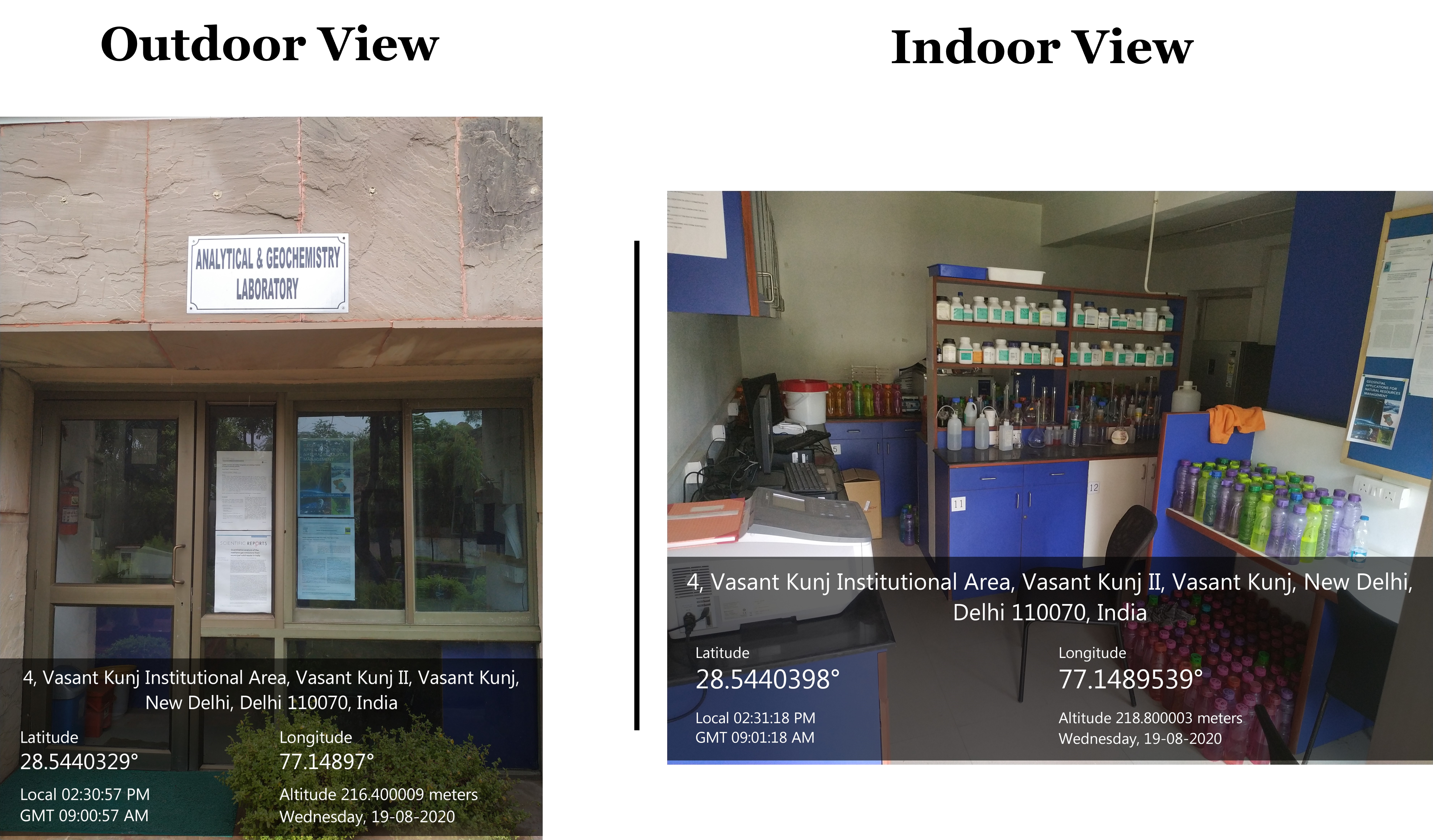
ANNOUNCEMENTS


Analytical and Geochemistry Laboratory (ARG-Arsenic Research Group) is the TERI SAS’s centre for advanced research on geogenic groundwater contaminants focusing on fate and transport of Arsenic, Fluoride and Uranium. The ongoing theme of the ARG relates to spatial patterns of geogenic contaminants in India and South and Southeast Asia at large. We believe in widespread deployment of field kits to ascertain the quality of water and to understand the mechanisms that drive the complex distribution of geogenic contaminants in groundwater. Thanks to the generous support from National Science Foundation (NSF, USA) and United States Agency for International Development (USAID), via PEER Science Award on “Targeting low-arsenic and low-fluoride groundwater to reduce exposure in rural Punjab, India” the lab houses water and sediment characterization instruments with a current total value of about Rs 7 million. These includes:
A. LED-Fluorimeter,
B. Diffuse spectral reflectance spectrophotometer
C. UV-Visible spectrophotometer
D. Flame photometer
E. Radiation survey meter
The lab has established linkages to Lamont Doherty Earth Observatory, Columbia University; Dept. of Engineering, Massachusetts Institute of Technology, Standford University. The lab also has developed linkages with institutions in India such as IIT Kharagpur, IIT Guwahati, Jawaharlal Nehru University, SPCB Bihar, Drinking Water Supply and Sanitation, Punjab, Board of Research in Nuclear Sciences.
M.Sc. Environmental Studies and Resource Management
----
The sample is nebulized in flame atomic emission spectrometry to determine the content of sodium, potassium, lithium, calcium in the sample.
FLUORAT-02 is a multifunctional fluorescence analyzer intended for analysis of water, soil, foodstuff, etc. This instrument determines a wide range of analytes based on fluorescence, chemiluminescence, phosphorescence and photometry techniques. FLUORAT-02-4M also provides phosphorescence measurement using the time-resolved gating fluorometer mode. In particular, this mode is used to determine uranium and is characterized by a very high sensitivity and selectivity. FLUORAT-02-5M can operate as a nephelometer for measuring turbidity.
The diffuse re¬ection spectra for two types of semiconductors (red line:Culn0.5Ga0.5Se2, blue line: CulnSe2) used as solar cell materials have been measured using the ISR-2600Plus integrating sphere. A key feature of the UV-2600i single monochromator system is its measurement wavelength range. By using the optional ISR-2600Plus Integrating Sphere attachment, the measurement wavelength range can be extended from 220 nm to 1400 nm, significantly expanding its applications. The UV-2600i is also equipped with Shimadzu’s proprietary.
Lo-Ray-Ligh grade diffraction grating, which achieves high efficiency and low stray light levels. By installing the ISR-2600Plus two-detector integrating sphere, the 300 nm to 1100 nm wavelength range of conventional models can be extended to 1400 nm. In addition, the UV-2600i achieves a significant noise reduction, and can accommodate measurements of solar cell anti-reflective films and polycrystalline silicon wafers
SOP’s manual for labs have been kept in the lab
Geology, Environment, Geogenic contaminants, Geology, Remote Sensing
• Singh CK, Kumar A, Shashtri S, Kumar A, Mallick J, Singh A, Avtar R, Singh RP, Kumar P, Ranjan S. 2021. Geochemical modeling to infer genetic origin of groundwater and associated health risks in desertic aquifers. Groundwater for Sustainable Development, p.100569. (Q1 Journal, SJR:0.867, Elsevier)
• Kumar A, Singh CK, Bostick B, Nghiem A, Mailloux B, van Geen A. 2020. Regulation of groundwater arsenic concentrations in the Ravi, Beas, and Sutlej floodplains of Punjab, India. Geochimica Cosmochimica Acta, 276, 384-403. (Q1 Journal, SJR:2.3, Elsevier, IF- 5.010)
• Kumar A, Roy SS, Singh CK. 2020. Geochemistry and associated human health risk through potential harmful elements (PHEs) in groundwater of the Indus basin, India. Environmental Earth Sciences, 79, 86. (Q2 journal, SJR:0.6, Springer, IF- 2.784)
• Kumar A, Singh CK. 2019. Arsenic enrichment in groundwater and associated health risk in Bari doab region of Indus basin, Punjab, India. 256, 113324. Environmental Pollution, (Q1 Journal, SJR:1.97, Elsevier, IF- 8.071)
• Bindal S, Singh CK. 2019. Predicting groundwater arsenic contamination: Regions at risk in highest populated state of India. Water Research, 159, 65-76. (Q1 Journal, SJR:2.93, Elsevier, IF: 11.236).
• van Geen A, Farooqi A, Kumar A, Khattak JA, Mushtaq N, Hussain I, Ellis T, Singh CK. 2018. Field testing of over 30,000 wells for arsenic across 400 villages of the Punjab plains of Pakistan and India: Implications for prioritizing mitigation. Science of The Total Environment, 654, 1358-1363 (Q1 Journal, SJR:1.66, Elsevier, IF:7.936).
• Singh CK, Kumar A, Bindal S. Arsenic contamination in Rapti River Basin, Terai region of India. Journal of Geochemical Exploration, 192, 120-131. (Q1 Journal, SJR:0.84, Elsevier, IF:3.746).
• Singh CK, Kumar A, Roy SS. 2018. Quantitative analysis of the methane gas emissions from municipal solid waste in India. Scientific Reports, 8(1), p.2913 (Q1 Journal, SJR:1.34, Nature, IF: 4.379).
• Barnwal P, van Geen A, von der Goltz J, Singh CK. 2017. Demand for environmental quality information and household response: Evidence from well-water arsenic testing. Journal of Environmental Economics and Management. 86, 160-192. (Q1 Journal, SJR:2.39, Elsevier, IF: 4.624)
• Singh CK, Kumar A, Shashtri S, Kumar A, Kumar P, Mallick J. 2017. Multivariate statistical analysis and geochemical modeling for geochemical assessment of groundwater of Delhi, India. Journal of Geochemical Exploration 175, 59-71 (Q1 Journal, SJR:0.84, Elsevier, IF:3.746).
Mailing address: Chander Kumar Singh, Analytical and Geochemistry Lab, TERISAS, New Delhi-110070
Email: AGL_arsenicresearchgroup@terisas.ac.in Phone number: +91 11 71800222
Plot No. 10, Institutional Area, Vasant Kunj, New Delhi - 110 070, India.
Tel. +91 11 71800222 (25 lines).
Website : www.terisas.ac.in
Email id : registrar@terisas.ac.in
© Copyright © 2025, TERI SAS, All rights reserved.
Visitors No.: 46053392 Since 2023


